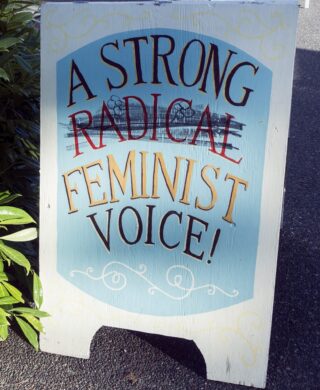In 2003, international men’s lifestyle magazine Maxim published an article entitled ‘How to Cure a Feminist’, promising tips on how to ‘turn an unshaven, militant, protesting vegan into an actual girl’. The article and accompanying graphic trotted out the same boring clichés that will be familiar to feminists even today, 12 years later – feminists don’t shave, feminists aren’t pretty, feminists have daddy issues. These are comments that don’t hurt or irritate, but now, simply bore.
It is odd that anti-feminist feelings should remain so static in nature when feminism has evolved so much over the past 12 years (if we are to continue using the Maxim article as a kind of 1 BC). Feminism has ‘gone viral’, as Youtube blogger Kat Lazo put it in her 2013 TEDx talk; the internet has equipped a new generation of feminists with the tools for social change – the ability to freely share views and beliefs, make connections with like-minded but geographically distant people, and access new and exciting medias.
Why, when defining feminism, are the feminists most comfortably digested by men presented as representative of us all?
Feminism is at the forefront of popular culture; prominent female and male musicians, actors and other celebrities discuss feminism, identify as feminists and make feminist statements everyday. The prominence of feminism on social media and in popular culture is powerful and exciting. That, for instance, a young woman could watch a viral music video such as ‘Anaconda’ and afterwards log onto Twitter or Facebook or tumblr to be directed to a plethora of feminist analyses of the lyrics and imagery, so she might consider concepts like the male gaze, cultural and racial appropriation, body ownership and autonomy and so on is incredibly empowering.
That celebrities are endorsing and embracing feminism, for these reasons, is fantastic. But the celebrity feminist statements that get quoted in headlines and interviews and on Facebook and Twitter follow a particular trend. They so often seem to be based on quelling the 2003 Maxim reader’s fears about feminists not being the submissive, shaven, conservative yet sexy girly-girl that they are used to. Take singer Kate Nash’s 2008 quote from her blog that still does the rounds today on social media: ‘[Feminism] … does not mean you hate men, it does not mean you hate girls that have nice legs and a tan, and it does not mean you are a bitch or a dyke, it means that you believe in equality’. This may be one strand of feminism, but some feminists do hate men. Some feminists self-define as ‘dykes’. Yes, a lot of feminists have nice legs and tans but a lot have unconventionally ‘nice’ legs also – why, when defining feminism, are the feminists most comfortably digested by men presented as representative of us all?
“You can be the gentlest, sweetest man in the world yet still benefit from sexism. That’s how oppression works”
In an interview with the Guardian, Taylor Swift explained her teenage interpretation of feminism –‘it seemed to me, the way it was phrased in culture, society, was that you hate men’ versus her adult one – ‘saying you’re a feminist is just saying that you hope women and men will have equal rights and equal opportunities’. Again, the comfort of men is made paramount in the explanation of a movement for women. Then there is the congratulations and celebrations for men who identify as feminists; Elle Magazine photographed male celebrities including Harry Styles, Benedict Cumberbatch and Tom Hiddlestone wearing a t-shirt emblazoned with the logo ‘this is what a feminist looks like’. The usage of male celebrities who are, supposedly, heartthrobs to women and heroes to men, carries a similarly comforting message to men who are scared or perturbed by feminism – ‘these people are normal and successful and best of all have penises, just like you! AND they’re feminists – can it really be so bad?’
That this effort exists to make feminism, a movement reactive to centuries of patriarchy, more comfortable and digestible for men is almost offensive.
Mainstream feminism is currently not particularly inclusive of all women
Men benefit from being men every single day. As Laurie Penny states, ‘[y]ou can be the gentlest, sweetest man in the world yet still benefit from sexism. That’s how oppression works.’ Feminism is empowering and passionate and exciting; it’s easy to see why men want in. But this is an ideological space in society that is truly for women, and men do not need to be made to feel comfortable and valued here because they have the rest of the world to make them feel comfortable and valued, and they should respect that. It makes sense that male privilege should not extend to feminism.
Furthermore, mainstream feminism is currently not particularly inclusive of all women. Women of ethnic minorities, for instance, experience sexism along another axes of oppression, and reminders of this are rampant in the same medium through which feminism is celebrated and discussed by celebrities – popular culture; see how much more the white female victim of torture in Rihanna’s ‘Bitch Better Have My Money’ caused outrage than Drake’s mixed-race girlfriend in ‘Hold On, We’re Going Home’, and how quickly white feminists were to criticize a black woman (Rihanna) committing violence against a white woman when black women have suffered the reverse for decades (this Black Girl Dangerous article sums this up succinctly). Alternatively, have a look at the Twitter exchange between Nicki Minaj and Taylor Swift (the self-defined feminist, remember) following Minaj’s calling out of music industry racism and Swift’s initial inability as a white woman to simply listen to and believe Minaj.
I could go on. And this is just race. Nevermind that prominent feminists exist who do not recognise trans women as women (perhaps most notably Julie Bindel) or that working-class women might feel patronized by or ostracized from the feminist movement. The ridiculous situation is this: feminists are putting more effort into creating an inclusive movement for men than marginalized women. It’s up to men who really care about equal rights to make the spaces they already occupy in society feminist – read books and articles by women (all women), invest in women’s ventures, employ women, call out your awful sexist friends – rather than it being up to feminism to accommodate for men.
Image: Quinn Dombrowski



